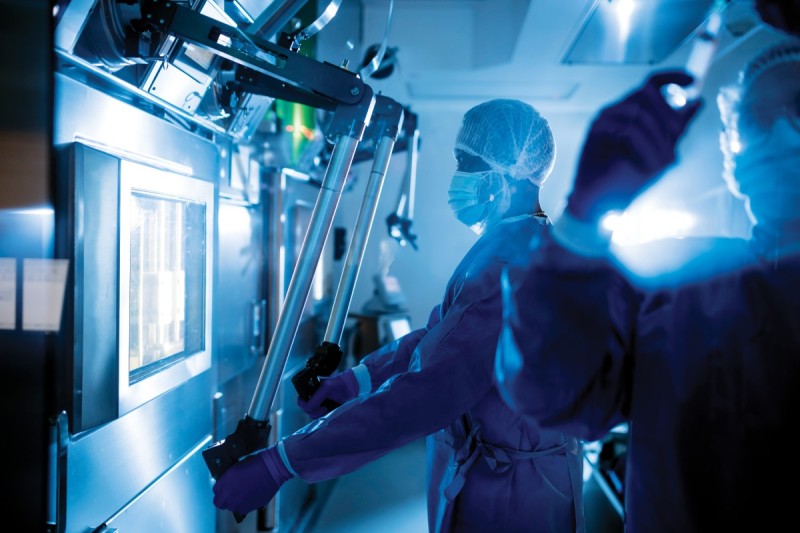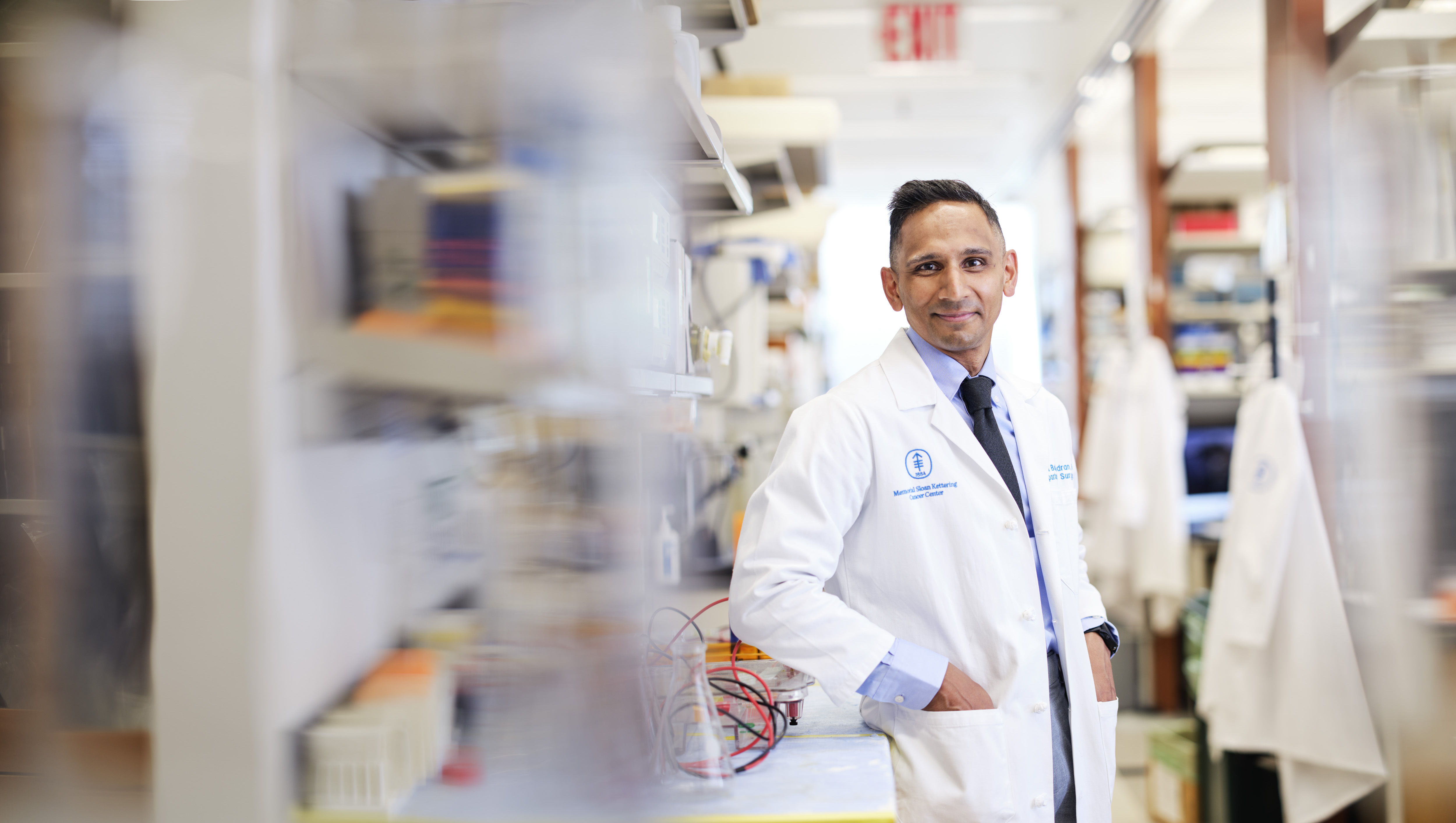
Students in the cancer engineering program will advance their research with support from state-of-the art core facilities including the Radiochemistry and Molecular Imaging Probes core.
Training the Next Generation of Science Leaders at Gerstner Sloan Kettering
As a student in the Pat and Ian Cook Doctoral Program in Cancer Engineering, you will work closely with some of the world’s top biologists and engineers to understand the most urgent needs in cancer and learn techniques for developing engineering solutions. Whatever problems you decide to tackle — delivering drugs across the blood-brain barrier, creating pancreatic cancer organoids, studying protein trafficking — our faculty mentors are dedicated to helping you succeed. You will be supported by MSK’s impressive roster of core facilities, which offer state-of-the-art resources for biological research that include unique engineering-focused technology, such as cell engineering, molecular cytogenetics, and radiochemistry and molecular imaging probes.
Through the coursework, you will learn to identify the important biological questions and be given the tools to develop answers and solutions to those questions. As part of the new program, you will join one of MSK’s 130 laboratories where you will investigate cancer science through basic, clinical, and translational research. We offer a unique opportunity for engineers and physical scientists who love making new technologies but would like to go a step further and put them into practice.
PhD Curriculum
The Cancer Engineering program at GSK combines a year of intensive coursework with research resulting in an original contribution to the scientific literature that is described in a dissertation. The curriculum provides training to PhD students that combines fundamental understanding of cancer biology and biomedical engineering principles.
Aspects of our curriculum include:
- A 10-to-1 faculty-to-new student ratio in a program that gives you training that combines Memorial Sloan Kettering Cancer Center’s basic science and clinical arms
- An innovative core course in the first year that provides a foundation in experimental, mechanistic, and cancer biology, taught by over 80 MSK faculty
- Full-time thesis research by year 2 of the program
- Opportunity to pair with a clinical mentor
- Exposure to cutting-edge science with MSK faculty
Faculty & Research

Dr. Vinod Balachandran’s lab is aiming to discover new ways to stimulate the immune system to treat cancer.
At GSK, our faculty includes 130+ scientists and engineers from MSK specializing in areas of cancer engineering, nanotechnology and biomaterials, imaging and theranostics, immuno-engineering, integrative computational biology, and genetic engineering. Each has been recognized as leaders in their fields around the world and typically MSK labs publish over 1,000 papers and file more than 100 patents applications each year.
When you begin your Cancer Engineering PhD program at GSK, you do not need to make a formal commitment to a particular laboratory. This gives you the flexibility to explore potential research mentors during the first-year curriculum as well as an opportunity to meet with faculty to learn about new areas of research before making your decision.
Learn more about GSK Faculty Members
Facilities
Memorial Sloan Kettering’s main campus is located on Manhattan’s Upper East Side. Our research space totals approximately 575,000 square feet, with many cutting-edge laboratories and facilities housed within the Rockefeller Research Laboratories building and the Zuckerman Research Center. This building has open, spacious floors to encourage collaboration.
Our dozens of research core facilities — ranging from radiochemistry and molecular imaging probes to cell therapy and cell engineering — serve both basic and clinical research needs. These shared facilities offer state-of-the-art instruments and technical staff support to graduate students as they train and conduct research projects.
In addition to core facilities, student research will be supported by the Bioengineering Service, which optimizes the use of technology to assure the safety, operating effectiveness, and regulatory compliance of electronic biomedical instruments used in patient care, laboratory functions, and research. Additionally, the service investigates new and evolving technologies and their potential integration into or use in the clinical and laboratory environments. This service offers an instrumentation shop with a 6 axis CNC and 5-axis lathe, manual mills, lathes, saws, forming tools, sandblasting, and manufacturing equipment for metals, plastics, wood and composites. It also has 3D printers, a large-scale 3D CNC router, and a simulation laboratory.
Student Life
Students in the GSK Cancer Biology PhD program are supported in both their academic and social needs, including:
- Housing options
- Career support
- Student facilities
- New York City’s scientific community
- The GSK Student Council
- GSK Women in Science
Admission Requirements
Students who wish to apply for the Cancer Engineering PhD program at the Gerstner Sloan Kettering Graduate School should have already completed a baccalaureate degree program at an accredited institution prior to matriculation. Their coursework and research experience should highlight a strong interest in the life sciences and demonstrated strength in mathematics, engineering, and/or physical sciences. Consideration is also given to applicants with strong, relevant life science backgrounds who have demonstrated quantitative skills.
Applicants should have completed the following college-level courses:
- General biology
- General chemistry
- General physics (two semesters)
-
Mathematics (four semesters, including calculus)
- Coursework in linear algebra and/or differential equations is strongly encouraged
- Extensive upper division coursework in in either engineering, physical sciences, or computer science
Applicants to this program should have exposure to both biology and more quantitative fields including math, physics, engineering, and computer science through a mix of coursework and research experience. Special requests by exceptional students for a waiver of any of these requirements will be evaluated within the context of the student’s academic record and prior research experience.
It is essential that applicants have significant science and/or engineering research experience. Letters of recommendation from research mentors and written comments from the applicant about prior research work are major components of the student admissions file. An applicant’s background will be evaluated based on how their training will allow them to succeed in the Cancer Engineering curriculum.
GSK does not accept Graduate Record Examination (GRE) scores. GRE scores are not requested on our application and will not be reviewed as part of the admissions process.
Application Information
The annual application window is from August to December 2. Applications should be submitted online.
GSK welcomes international students. Learn more about how to apply.
Get more information about the admissions process.
Still have questions?
Get answers to frequently asked questions about GSK’s Cancer Engineering PhD program.